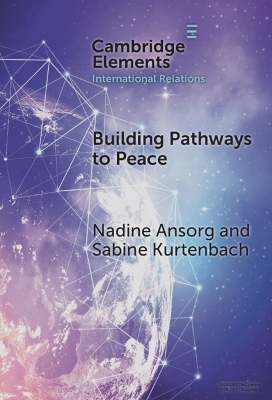
Building Pathways to Peace
State–Society Relations and Security Sector Reform
Seiten
2023
Cambridge University Press (Verlag)
978-1-009-46266-2 (ISBN)
Cambridge University Press (Verlag)
978-1-009-46266-2 (ISBN)
This Element promotes a radical re-think of SSR in the context of conflict and war. Second generation SSR recognizes local communities and non-state actors in security and justice. It argues that a focus on functional equivalents, minorities, gender, and human rights is key for the design, implementation, and success of SSR.
SSR is a key element of the transitions out of war, aiming at the establishment of accountable and legitimate institutions able to prevent and sanction the use of violence. While recognizing the need to include local actors, donor policies still focus mostly on the state as a provider of security. Second generation SSR has emphasized the need to include local communities and recognize the existence of non-state actors in the provision of security and justice. However, recognition is not enough. This Element promotes a radical re-think of SSR in the context of conflict and war. Guiding question for the considerations is how can security sector reform be set up and implemented to contribute to constructive and inclusive state-society relations, and build the path to long-lasting peace? This Element argues that a focus on functional equivalents, minorities, gender, and human rights is key for the design, implementation, and success of SSR.
SSR is a key element of the transitions out of war, aiming at the establishment of accountable and legitimate institutions able to prevent and sanction the use of violence. While recognizing the need to include local actors, donor policies still focus mostly on the state as a provider of security. Second generation SSR has emphasized the need to include local communities and recognize the existence of non-state actors in the provision of security and justice. However, recognition is not enough. This Element promotes a radical re-think of SSR in the context of conflict and war. Guiding question for the considerations is how can security sector reform be set up and implemented to contribute to constructive and inclusive state-society relations, and build the path to long-lasting peace? This Element argues that a focus on functional equivalents, minorities, gender, and human rights is key for the design, implementation, and success of SSR.
1. Security sector reform as a wicked problem; 2. SSR and state-society relations – A novel theoretical framework; 3. A mixed-methods approach; 4. Quantitative study: provisions and implementation of security sector reform after war; 5. Comparative case studies: a societal perspective on SSR in Afghanistan and Colombia; 6. State-Society relations and the establishment of peace; Bibliography.
| Erscheinungsdatum | 28.11.2023 |
|---|---|
| Reihe/Serie | Elements in International Relations |
| Zusatzinfo | Worked examples or Exercises |
| Verlagsort | Cambridge |
| Sprache | englisch |
| Maße | 160 x 235 mm |
| Gewicht | 260 g |
| Themenwelt | Sozialwissenschaften ► Politik / Verwaltung ► Staat / Verwaltung |
| ISBN-10 | 1-009-46266-0 / 1009462660 |
| ISBN-13 | 978-1-009-46266-2 / 9781009462662 |
| Zustand | Neuware |
| Informationen gemäß Produktsicherheitsverordnung (GPSR) | |
| Haben Sie eine Frage zum Produkt? |
Mehr entdecken
aus dem Bereich
aus dem Bereich
Organisationen steuern, Strukturen schaffen, Prozesse gestalten
Buch | Softcover (2024)
Rehm Verlag
38,00 €


